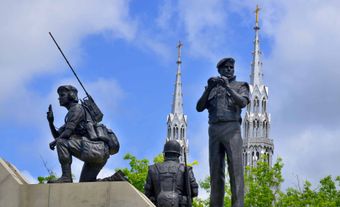This article was originally published in Maclean's Magazine on July 28, 2003
Violence Continues Against US Soldiers in Iraq
IT WAS THE STUFF that presidential campaign commercials are made of. On May 1, a flight-suited George W. Bush, the former National Guard pilot turned commander-in-chief, swooped down to the deck of a U.S. aircraft carrier to press the flesh with victory-flushed sailors and airmen. There was red, white and blue bunting, a military band and a speech before a cheering crowd declaring Saddam Hussein vanquished, an end to major hostilities, and Iraq liberated. Two-and-a-half months later, however, the continuing violence in the cradle of civilization is rocking the Republicans' carefully plotted course to the November 2004 election. While pundits aren't ready to cry swamp, bog, or quagmire, let alone invoke the adjective pyrrhic, a consensus is building - America's whuppin' of Baghdad isn't looking like such an unqualified success anymore.
A typical day in Iraq now sees 12 guerrilla attacks against American troops. That results in, on average, 22 wounded soldiers, and three Stars and Stripes-draped coffins making the long flight home from the Middle East every week. Papers and magazines in the U.S. have already taken to running Vietnam-style photo spreads of the smiling faces of the recently departed. Defense Secretary Donald Rumsfeld is now suggesting strengthening the current occupation force of 147,000 U.S. and 13,000 allied troops, and battle-weary grunts who expected to rotate home later this summer were told last week that their stay has been indefinitely extended. The cost of the American military presence in Iraq has ballooned to US$4 billion a month, double the Pentagon's earlier estimate, at a time when the White House is racking up a record US$455-billion annual budget deficit, and unemployment is at a nine-year high.
Buffeted by continuing questions about overstated intelligence assessments and Saddam's so-far non-existent weapons of mass destruction, Bush has seen his approval rating drop by as much as 16 points since Baghdad was conquered - though at about 60 per cent he can hardly be considered unpopular. Still, his would-be Democratic challengers in 2004, sensing weakness for the first time since Sept. 11, are straining to make the President's credibility an issue. And that leaves the sure-footed Bush administration in an unaccustomed position: playing defence.
Perhaps even more worrying for the Republicans is the growing chorus of military and security experts - the people who just a few months ago were applauding Bush's decision to go to war - now saying that the administration should have seen it all coming. "This kind of continuing resistance in Iraq was almost inevitable," says Anthony Cordesman, an analyst with the Center for Strategic & International Studies in Washington. "If there is a failure, it's in people not understanding the security effort that would be required, and underestimating how entrenched Saddam's Baathist regime was."
In Washington, there is a growing sense that Pentagon planners and administration officials are guilty of believing their own overhyped predictions, about everything from surrender-inducing "shock and awe" airstrikes, and the joyous welcome awaiting allied troops, to rapid reconstruction efforts paid for by free-flowing Iraqi oil. The combined effects of Saddam's decades of misrule, the years of international sanctions, and widespread looting, are proving far more difficult to overcome than forecast. The process of restoring basic services and oil exports has been painfully slow, and by some estimates the rebuilding of Iraq will now take a decade and cost US$90 billion. On the ground, blunders during the first months of U.S. occupation - like the disbanding of Saddam's army, and then the confusion over continuing to pay soldiers - have wasted goodwill and exacerbated existing divisions within the country.
The newly constituted 25-member interim governing council, which draws heavily from the exile community and all but ignores the so-called Sunni triangle - the area bordered by Baghdad, Tikrit and Ar Ramadi, Saddam's power centres, where most of the fighting is taking place - may only make matters worse, says one Iraqi opposition leader. According to Laith Kubba, a political scientist and president of the Washington-based Iraq National Group, the gap between U.S. rhetoric and reality has left the populace disillusioned. "America must not fear democracy in Iraq," he says. "What we need most is for Bush to announce a political process and a rough timetable for handing over power. People can endure hardship, they can wait, but only if they know there is light at the end of the tunnel."
The continued rumblings in Iraq are being felt in London as well. Tony Blair, Bush's staunchest defender and ally in the efforts to unseat Saddam, has also been caught up in the controversy over non-existent weapons of mass destruction and inaccurate intelligence reports - false claims that Iraq tried to purchase uranium from Niger appear to have come from British intelligence. The prime minister has seen his personal popularity plummet (a recent London Times poll found 54 per cent of respondents now don't trust Blair "as far as they could throw him"), while his Labour government is bedevilled by internal strife. A round-the-world tour, including a stop in Washington last week to address a joint session of Congress, has only fanned anger back home.
Richard Sennett, a sociologist at the London School of Economics, says Blair's current problems appear deeper than Bush's because of widespread disenchantment with the way his government operates. "Labour has proven to be very good at winning arguments, but the public is starting to feel this constant we-know-best attitude is arrogant," says Sennett. The war deeply divided Britain and was unpopular among traditional Labour supporters. Blair, who won back-to-back majorities by promising a new, more responsive style of government, is now perceived as no better than previous PMs. "It's like a long-term marriage - once the fantasy level wears off, questions of fidelity and honesty are what matter," says Sennett.
Bush's image problems aren't as dire, but there seems little doubt that his administration's decision to focus pre-war attention on Saddam's supposed weapons of mass destruction has come at a price. There were always other reasons - securing oil reserves, remaking the map of the Middle East, removing a tyrant, teaching an old adversary a lesson - why Washington felt it was in America's best interests to overthrow Saddam. But by eschewing efforts to find a diplomatic solution, and arguing that Saddam's long-standing weapons programs were an immediate threat to world security, Bush's team has left itself vulnerable to charges it manipulated public opinion.
Michael O'Hanlon, a senior fellow at the Brookings Institution, a Washington think-tank, says he doubts the current furor over credibility will reach scandal proportions. But when combined with the other challenges facing Bush - a flagging economy, a crisis in the health-care system, budget deficits - it adds significant fuel to a spreading fire. "In my judgment, the American people would not have supported the war if not for the arguments about Saddam's weapons," he says. And no matter who ends up taking the blame for the faulty intelligence presented to Congress, the UN and the world public, many people are starting to think they were duped. "We didn't have quite the rush to war as the administration claimed," says O'Hanlon, who supported Bush's decision. "Now it seems that we could have spent three or four months trying to forge an ultimatum the whole world could have accepted."
The Republicans are clearly worried about Bush's precipitous drop in the approval polls - nine points in just 18 days, according to a recent Washington Post/ABC News survey. They are also lashing out at negative media coverage - irked by a report on plunging morale among U.S. soldiers in Iraq last week, a White House source responded by pointing out that the journalist, Jeffrey Kofman, is both openly gay - and Canadian. But Bush advisers continue to take solace from the less-than-stellar field of potential Democratic opponents for 2004. The President's most effective tormentors, former Vermont governor Howard Dean, and John Kerry, a senator from Massachusetts, were favoured by, respectively, just eight and 12 per cent of voters in a recent national poll.
Andrew Kohut, director of the Pew Research Center, notes that Bush's approval ratings are still above pre-Sept. 11 levels, and remain high on questions of security and the war on terrorism. It may be tempting to look for parallels between the current president and the fate his father met after his success in the 1991 Gulf War, but the priorities of the American public have changed. "George W. Bush won't just be judged on the economy, but also on his conduct of foreign policy," says Kohut. "Commander-in-chief is back on the presidential job qualification list." Credibility does matter to U.S. voters, but with a few decades of scandals behind them, they have learned to be relatively tolerant of missteps. "For an American politician, exaggeration is different than lying," says Kohut.
But Republicans may not be able to control what events on the ground in Iraq do to their re-election hopes. If the current rate of fighting continues, there would be 200 more dead and 1,500 more wounded U.S. soldiers before November 2004 rolls around. And those are the kind of grim numbers that turn quick military "victories" into polling-station defeats.
Maclean's July 28, 2003

 Share on Facebook
Share on Facebook Share on X
Share on X Share by Email
Share by Email Share on Google Classroom
Share on Google Classroom


